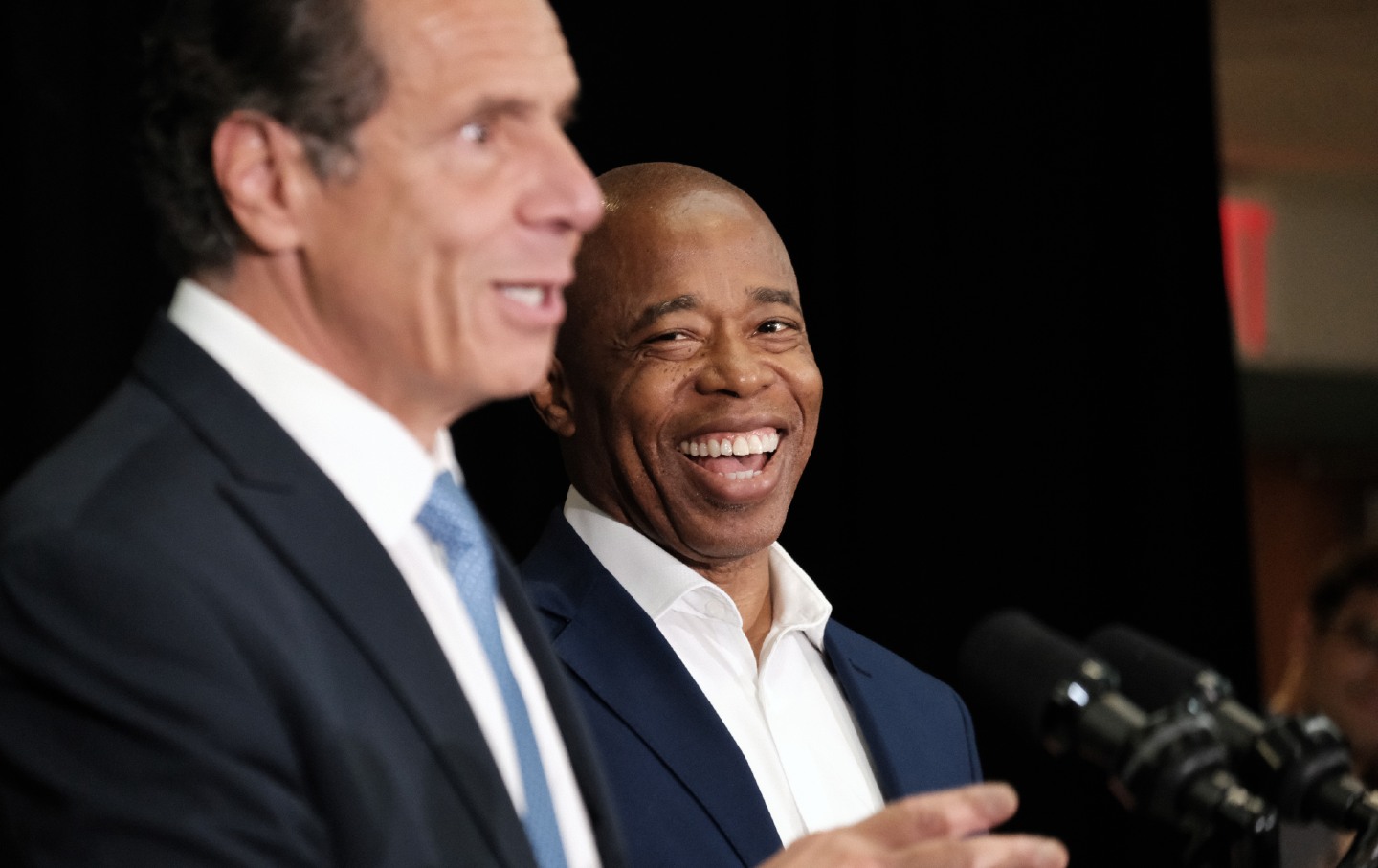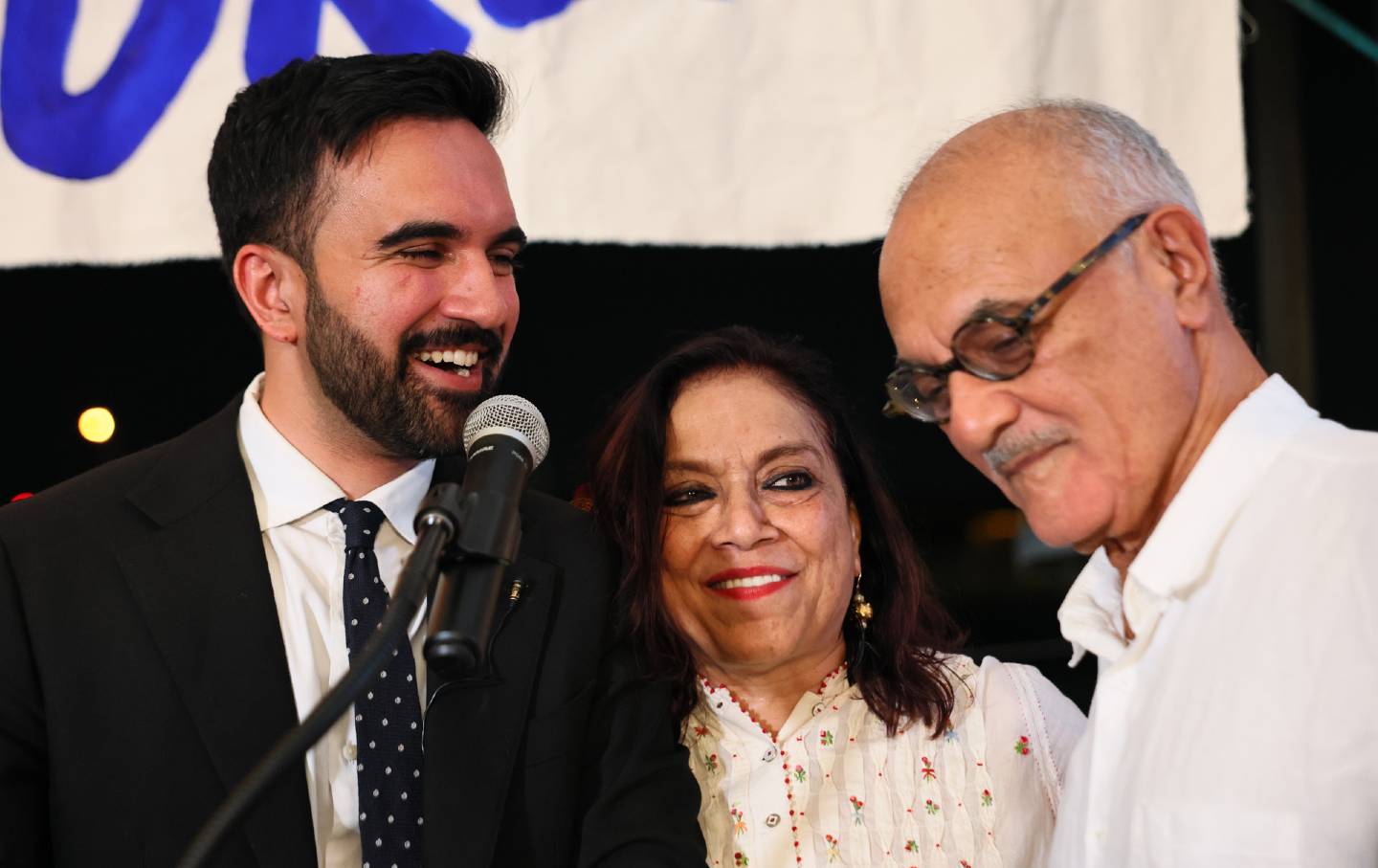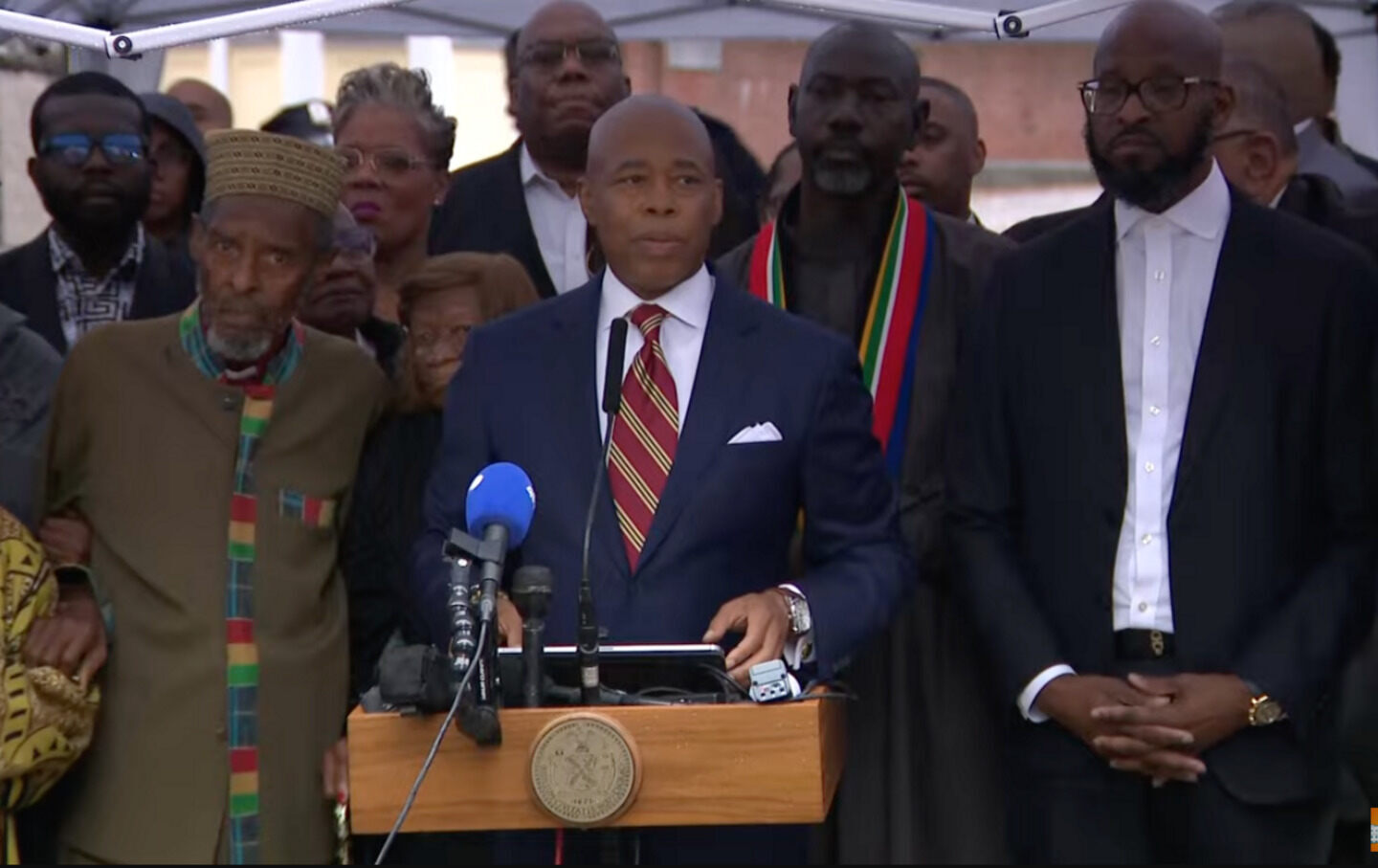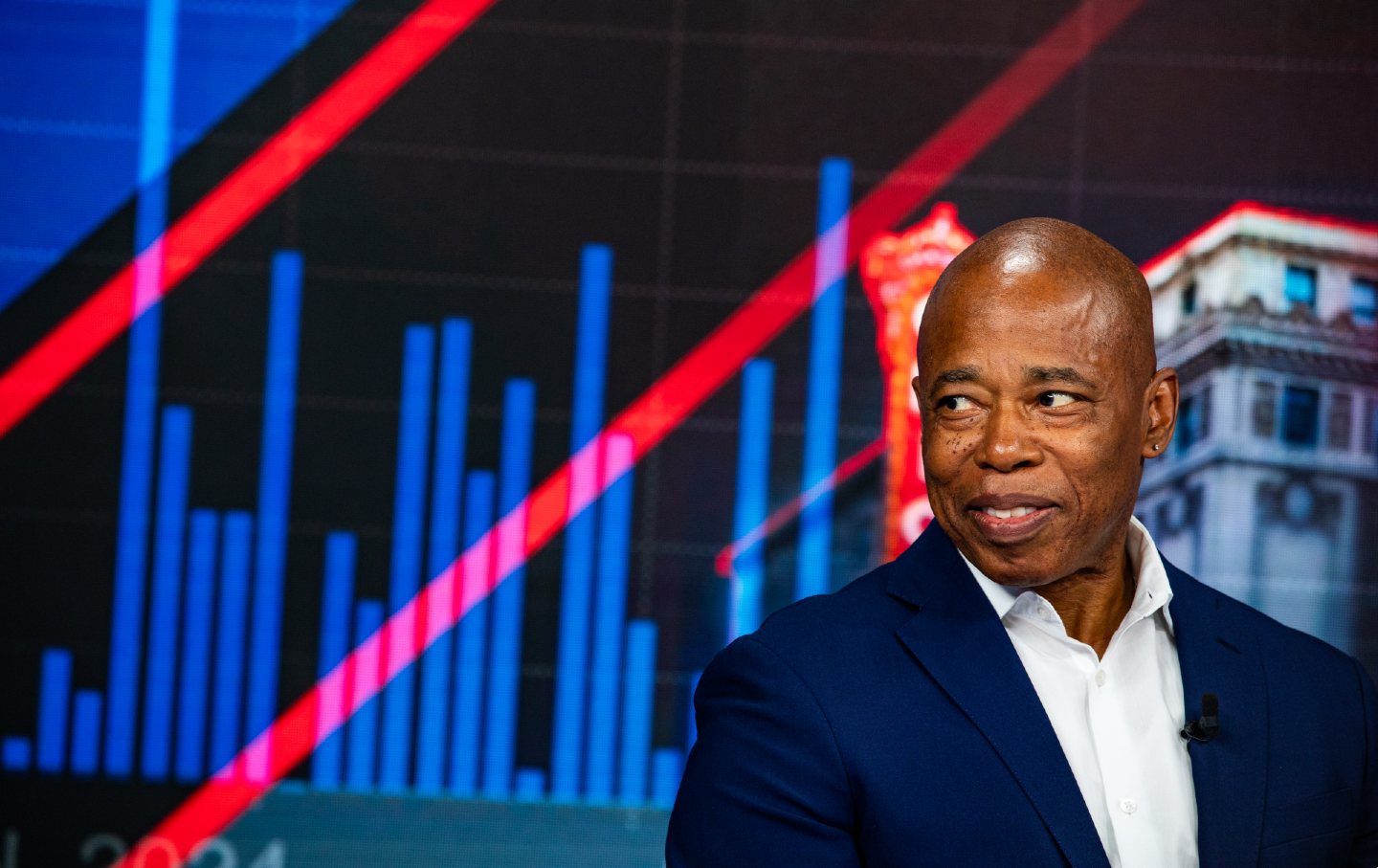Blink and You Missed It: NYC Mayor Eric Adams Was Accused of Sexual Assault—and Nothing Happened
Why the big yawn by the media over this particular allegation against New York’s scandal-surrounded mayor might actually be a sign of mature judgment.

Amid the swirling federal investigations into the ethical conduct of Eric Adams, it was news that hardly registered—a woman had accused the mayor of New York City of sexual assault.
The accusation, detailed in a civil lawsuit, dates back to an incident that allegedly occurred in 1993, when Adams was a transit police officer. The accuser, Lorna Beach Mathura, alleges sexual assault, battery, and employment discrimination based on gender, in addition to claims of retaliation and the creation of a hostile work environment. Mathura seeks no less than $5 million dollars, as well as attorney’s fees and interest, at a jury trial.
Adams strongly denied the allegations. “People know my character and I could just emphatically state this never took place. And it’s just not who I am. I would never do anything to harm someone,” he told reporters.
While Adams has faced mounting scrutiny over an FBI raid of his chief fundraiser’s house and the seizure of his phones as part of a broader inquiry into his 2021 mayoral campaign—focusing on whether he conspired with members of the Turkish government to receive illegal donations and apply pressure on city officials to sign off on a new consulate building—there has been remarkably little coverage of Mathura’s allegation. This is notable, in part, because it was another sexual assault allegation—this one from the early 2000s—that derailed the mayoral campaign of a top Adams rival, Scott Stringer. (Adams has not been accused of wrongdoing in the federal investigation.)
Stringer, like Adams, denied the alleged assault ever took place and eventually lodged a defamation lawsuit against his accuser. The lawsuit was recently tossed. But Stringer had already paid an enormous political price: He was a top-tier mayoral candidate who lost endorsements and cratered in the polls, eventually finishing a distant seventh in the 2021 Democratic primary.
So far, Adams has not drawn outright condemnation from any quarter. “I want to hear more. I want to make sure I’m not throwing anybody under the bus without evidence,” Diana Ayala, a city councillor who pulled her support from Stringer in 2021, told Politico last month. Ayala added that she believed one difference was the fact that Adams is a sitting mayor and Stringer was merely a candidate. “We don’t want to talk out of both sides of our mouth and say ‘innocent until proven guilty except the mayor because I don’t like you.’”
The details of the Adams accusation, so far, are rather scant. Jean Kim, Stringer’s accuser, appeared at press conferences and was active in Democratic politics; to the media, she was able to clear a certain credibility threshold. (A second woman also accused Stringer of unwanted sexual advances in the early 1990s, a charge he also denied.) Much less is known about Mathura, who has a history of lodging lawsuits on a wide variety of matters—a possible factor in the lack of media response to her latest.
But Ayala’s comments speak to a broader current in politics today: As the fervor of the #meToo movement, which burst into the public consciousness with the substantiated assault allegations against Harvey Weinstein, wanes, accusations alone no longer carry the same amount of weight. In the late 2010s and early 2020s, the slogan of the movement, “Believe all women,” seemed to be enough.
Now, politicians and activists are proceeding with much more caution.
Fear of overreach, at the minimum, is much greater than it once was. A significant number of rank-and-file Democrats now regret backing Senator Kirsten Gillibrand’s successful push to oust Al Franken, her colleague from Minnesota, from the Senate after the former comedian was repeatedly accused of sexual misconduct. Franken was forced to resign in early 2018—before a Senate ethics committee finished its review.
A little more than a year later, Gillibrand kicked off her campaign for the presidency. Entering the race with much fanfare, the New York senator struggled to gain traction as some donors shunned her and voters wondered why Franken had been so speedily purged from the Senate. Unable to build support in Iowa or New Hampshire, Gillibrand dropped out before voting began.
Stringer is not Franken, but there are left-leaning Democrats in New York who now wish the former city comptroller had been able to seize the nomination from Adams, a more moderate politician who has careened from scandal to scandal. Before Kim’s allegation surfaced, Stringer had been endorsed by the Working Families Party and a host of progressive politicians across the city. He was assembling a formidable coalition, and higher-prize endorsements, like the editorial board of the New York Times and even Alexandria Ocasio-Cortez, seemed within reach. A product of the reform-oriented Manhattan clubhouses, Stringer was not especially thrilling to the grassroots, but he was, for many activists and donors, the preferred choice over Adams. His mix of liberalism and technocratic bona fides offers, in retrospect, more appeal to a slice of the electorate that migrated away from him in the primary.
Stringer is now reportedly mulling another campaign against Adams. Ironically, it is Adams himself who benefits from the newfound cautionary approach of various political actors. There is much more chatter about due process in 2023 than there was in 2021.
Another politician hoping that this zeitgeist shift will ultimately benefit him is Andrew Cuomo, the disgraced former governor who resigned several months after Kim brought her allegation against Stringer. Cuomo flirted last year with running against his successor, Kathy Hochul, and is now weighing a mayoral bid against Adams for 2025. At least one poll has shown a hypothetical Cuomo bid leading the pack if a special election were held, and the former governor would, undoubtedly, be formidable, even with high negatives. But the difference between Cuomo and Stringer—or Cuomo and Franken—is the sheer number of allegations that were lodged against him. By the time of his resignation, at least 11 women had accused the domineering Democrat of unwanted groping, kissing, and sexual comments.
Popular
“swipe left below to view more authors”Swipe →The allegations were detailed in a report from Cuomo’s erstwhile ally Letitia James, the state attorney general. All of that would be back in the news if Cuomo decided, upon moving back to New York City, to run for mayor. (The Adams administration, in a preview of attacks to come, claimed that polls showing the mayor’s significant decline in support were merely “shameful” attempts “to tear down the city’s second black mayor for blatant political purposes.”)
It was the AG report, ultimately, that tipped New York’s Democrats over the edge and increased the likelihood that Cuomo would be impeached. Like Richard Nixon, he resigned to avoid such a fate. Like Nixon, he understood that he was not going to win a trial. Had Cuomo been impeached, the Democrat-run state Senate would have gladly removed him from office.
This standard—waiting for allegations to accrue evidence and, if possible, be investigated by an outside party—is the healthiest for a body politic. The #meToo movement was necessary, forcing a long overdue reckoning with how men in power treated women in Hollywood, the media, corporate America, and the political arena. But it is not unjust that Adams is not being driven from office because a single person accused him of sexual assault 30 years ago. Since a lawsuit has been brought, the courts will examine the allegations, and conclusions can be drawn when that process is finished. The same is true when—or if—federal prosecutors bring charges connected to their investigation of Adams’s political conduct. For now, New York’s political class—wisely for once—seems inclined to wait-and-see.
Disobey authoritarians, support The Nation
Over the past year you’ve read Nation writers like Elie Mystal, Kaveh Akbar, John Nichols, Joan Walsh, Bryce Covert, Dave Zirin, Jeet Heer, Michael T. Klare, Katha Pollitt, Amy Littlefield, Gregg Gonsalves, and Sasha Abramsky take on the Trump family’s corruption, set the record straight about Robert F. Kennedy Jr.’s catastrophic Make America Healthy Again movement, survey the fallout and human cost of the DOGE wrecking ball, anticipate the Supreme Court’s dangerous antidemocratic rulings, and amplify successful tactics of resistance on the streets and in Congress.
We publish these stories because when members of our communities are being abducted, household debt is climbing, and AI data centers are causing water and electricity shortages, we have a duty as journalists to do all we can to inform the public.
In 2026, our aim is to do more than ever before—but we need your support to make that happen.
Through December 31, a generous donor will match all donations up to $75,000. That means that your contribution will be doubled, dollar for dollar. If we hit the full match, we’ll be starting 2026 with $150,000 to invest in the stories that impact real people’s lives—the kinds of stories that billionaire-owned, corporate-backed outlets aren’t covering.
With your support, our team will publish major stories that the president and his allies won’t want you to read. We’ll cover the emerging military-tech industrial complex and matters of war, peace, and surveillance, as well as the affordability crisis, hunger, housing, healthcare, the environment, attacks on reproductive rights, and much more. At the same time, we’ll imagine alternatives to Trumpian rule and uplift efforts to create a better world, here and now.
While your gift has twice the impact, I’m asking you to support The Nation with a donation today. You’ll empower the journalists, editors, and fact-checkers best equipped to hold this authoritarian administration to account.
I hope you won’t miss this moment—donate to The Nation today.
Onward,
Katrina vanden Heuvel
Editor and publisher, The Nation
More from Ross Barkan

With Zohran Mamdani’s Surreal and Historic Victory, One City Died—and Another Was Born With Zohran Mamdani’s Surreal and Historic Victory, One City Died—and Another Was Born
Neither Bill Clinton nor Jim Clyburn nor all of Michael Bloomberg’s billions could save Andrew Cuomo from the defeat he deserved.

Eric Adams Has Been Indicted. What Now? Eric Adams Has Been Indicted. What Now?
The Southern District has indicted New York City’s mayor. But anyone who claims to be certain of the trajectory of the next six months is lying to you.

Is Eric Adams’s Luck About to Run Out? Is Eric Adams’s Luck About to Run Out?
Losing one police commissioner might be merely careless. But losing two—with a number of federal investigations targeting the mayor’s inner circle—has encouraged challengers.

A Close-Up View of the UK Election Gave Rise to an Unfamiliar Emotion: Envy A Close-Up View of the UK Election Gave Rise to an Unfamiliar Emotion: Envy
The US left can only dream of Democrats’ having five years ahead of interrupted power—and control of Congress—with the GOP, like the Tories, driven far to the margins for a d...

Has NY Governor Kathy Hochul Killed Congestion Pricing For Good? Has NY Governor Kathy Hochul Killed Congestion Pricing For Good?
Or just until after the election? Either way, she’s blown a $15 billion hole in the MTA budget, leaving New Yorkers with overcrowded streets, filthy air, and an underfunded subwa...

Why Are Armed Troops in NYC Subways? Why Are Armed Troops in NYC Subways?
Kathy Hochul made a grave miscalculation by further militarizing a city she doesn’t live in or understand.


